Tunisia - TN - TUN - TUN - Africa
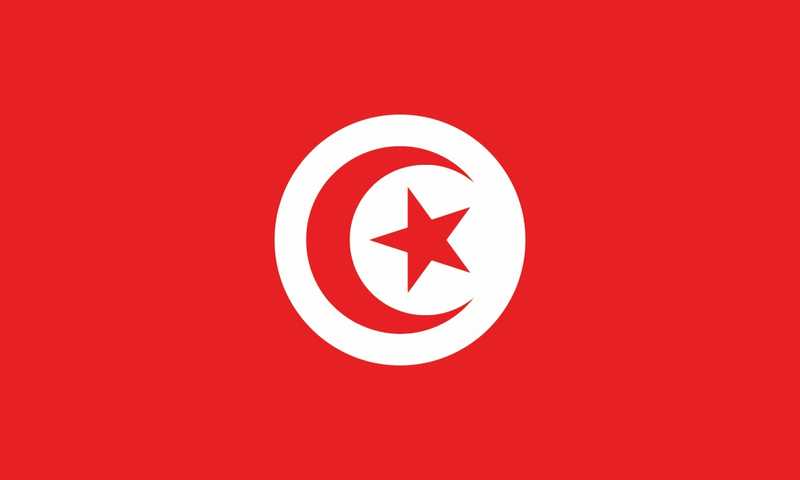
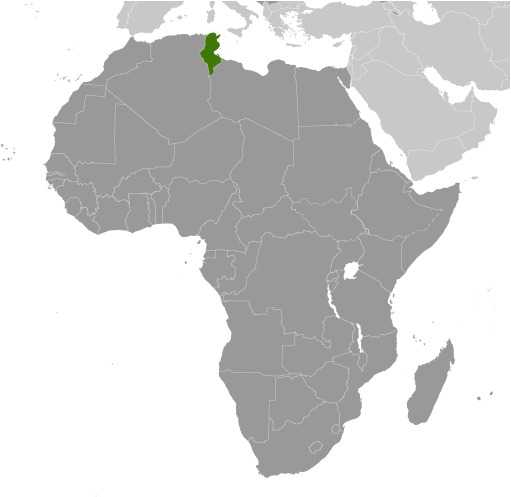
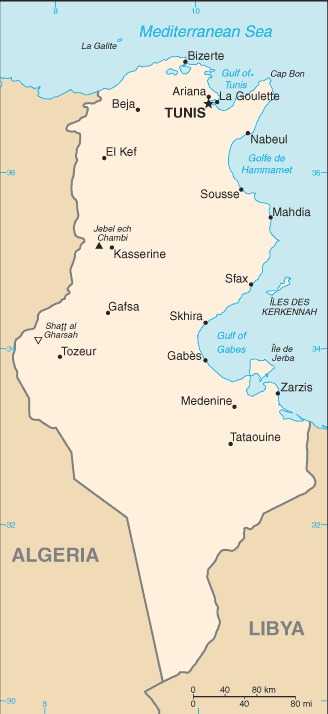
Tunisia Images
Tunisia Factbook Data
Diplomatic representation from the US
embassy: Les Berges du Lac, 1053 Tunis
mailing address: 6360 Tunis Place, Washington DC 20521-6360
telephone: [216] 71-107-000
FAX: [216] 71-107-090
email address and website:
tuniswebsitecontact@state.gov
https://tn.usembassy.gov/
Age structure
15-64 years: 65.2% (male 3,861,731/female 3,990,802)
65 years and over: 10.4% (2024 est.) (male 593,640/female 659,281)
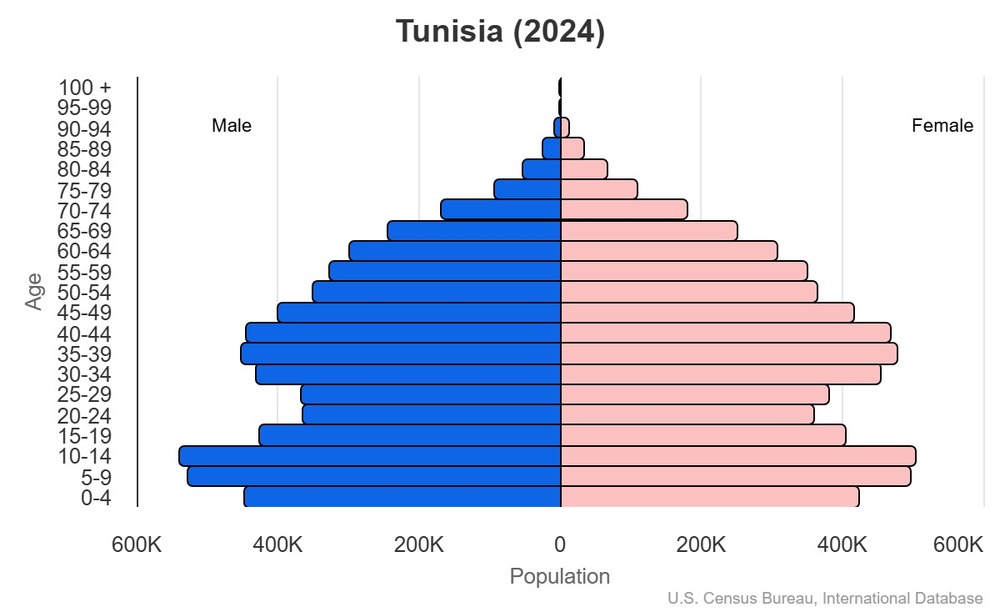
For additional information, please see the entry for Population pyramid on the Definitions and Notes page.
Geographic coordinates
Sex ratio
0-14 years: 1.06 male(s)/female
15-64 years: 0.97 male(s)/female
65 years and over: 0.9 male(s)/female
total population: 0.98 male(s)/female (2024 est.)
Natural hazards
Area - comparative
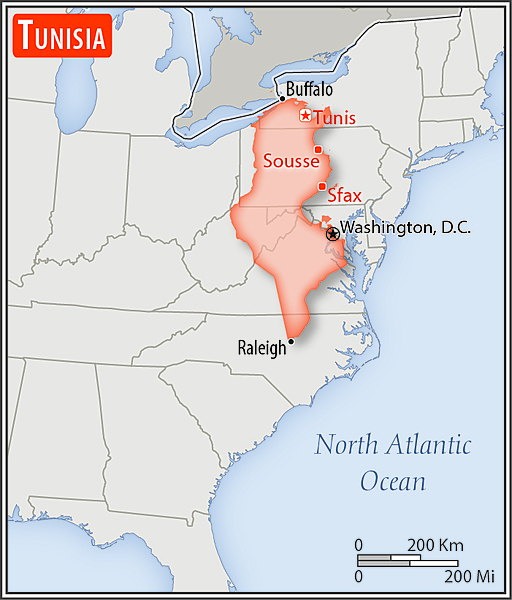
slightly larger than Georgia
Military service age and obligation
note: women have been allowed in the service since 1975 as volunteers; as of 2023, women constituted about 8% of the military and served in all three services
Background
Many empires have controlled Tunisia, including the Phoenicians (as early as the 12 century B.C.), Carthaginians, Romans, Vandals, Byzantines, various Arab and Berber kingdoms, and Ottomans (16th to late-19th centuries). Rivalry between French and Italian interests in Tunisia culminated in a French invasion in 1881 and the creation of a protectorate. Agitation for independence in the decades after World War I finally convinced the French to recognize Tunisia as an independent state in 1956. The country's first president, Habib BOURGUIBA, established a strict one-party state. He dominated the country for 31 years, repressing Islamic fundamentalism and establishing rights for women. In 1987, Zine el Abidine BEN ALI replaced BOURGUIBA in a bloodless coup.
Street protests that began in Tunis in 2010 over high unemployment, corruption, widespread poverty, and high food prices escalated in 2011, culminating in rioting that led to hundreds of deaths and later became known as the start of the regional Arab Spring uprising. BEN ALI dismissed the government and fled the country, and a "national unity government" was formed. Elections for the new Constituent Assembly were held later that year, and human rights activist Moncef MARZOUKI was elected as interim president. The Assembly began drafting a new constitution in 2012 and, after several iterations and a months-long political crisis that stalled the transition, ratified the document in 2014. Parliamentary and presidential elections for a permanent government were held at the end of 2014. Beji CAID ESSEBSI was elected as the first president under the country's new constitution. After ESSEBSI’s death in office in 2019, Kais SAIED was elected. SAIED's term, as well as that of Tunisia's 217-member parliament, was set to expire in 2024. However, in 2021, SAIED used the exceptional powers allowed under Tunisia's constitution to dismiss the prime minister and suspend the legislature. Tunisians approved a new constitution through public referendum in 2022, expanding presidential powers and creating a new bicameral legislature.
Environmental issues
International environmental agreements
signed, but not ratified: Marine Life Conservation
Military expenditures
2.5% of GDP (2023 est.)
2.7% of GDP (2022 est.)
3% of GDP (2021 est.)
3% of GDP (2020 est.)
Population below poverty line
note: % of population with income below national poverty line
Household income or consumption by percentage share
highest 10%: 27% (2021 est.)
note: % share of income accruing to lowest and highest 10% of population
Exports - commodities
note: top five export commodities based on value in dollars
Exports - partners
note: top five export partners based on percentage share of exports
Administrative divisions
Agricultural products
note: top ten agricultural products based on tonnage
Military and security forces
Ministry of Interior (MoI): Internal Security Forces (National Police, National Guard) (2025)
note: the National Police has primary responsibility for law enforcement in the major cities, while the National Guard (gendarmerie) oversees border security and patrols smaller towns and rural areas
Budget
expenditures: $12.375 billion (2019 est.)
Capital
geographic coordinates: 36 48 N, 10 11 E
time difference: UTC+1 (6 hours ahead of Washington, DC, during Standard Time)
etymology: the origin of the ancient name is unclear; it is sometimes associated with the name of the Phoenician goddess Tanith
Imports - commodities
note: top five import commodities based on value in dollars
Climate
Coastline
Constitution
amendment process: proposed by the president of the republic or one third of the Assembly of the Representatives of the People membership; following Constitutional Court review, approval to proceed requires an absolute majority vote in the Assembly, and final passage requires a two-thirds Assembly majority vote; the president can opt to submit an amendment to a referendum, which requires an absolute majority of votes cast for passage
Exchange rates
Exchange rates:
3.107 (2024 est.)
3.106 (2023 est.)
3.104 (2022 est.)
2.794 (2021 est.)
2.812 (2020 est.)
Executive branch
head of government: Prime Minister Sarra ZAAFRANI Zenzri (since 21 March 2025)
cabinet: prime minister appointed by the president; cabinet members appointed by the president in consultation with the prime minister
election/appointment process: president directly elected by absolute-majority popular vote in 2 rounds, if needed, for a 5-year term (eligible for a second term)
most recent election date: 6 October 2024
election results:
2024: Kais SAIED reelected president in first round - Kais SAIED (independent) 90.7%, Ayachi ZAMMEL (Long Live Tunisia) 7.3%, Zouhair MAGHZAOUI (People's Movement) 2%
2019: Kais SAIED elected president in second round; percent of vote in first round - Kais SAIED (independent) 18.4%, Nabil KAROUI (Heart of Tunisia) 15.6%, Abdelfattah MOUROU (Nahda Movement) 12.9%, Abdelkrim ZBIDI (independent) 10.7%, Youssef CHAHED (Long Live Tunisia) 7.4%, Safi SAID (independent) 7.1%, Lotfi MRAIHI (Republican People's Union) 6.6%, other 21.3%; percent of vote in second round - Kais SAIED 72.7%, Nabil KAROUI 27.3%
expected date of next election: 2029
note: the president can dismiss any member of government on his own initiative or in consultation with the prime minister
Flag
meaning: red stands for martyrs' blood shed the fight against oppression, and white for peace; the crescent and star are traditional symbols of Islam
history: resembles the Ottoman flag (red banner with white crescent and star), a reference to Tunisia's history as part of the Ottoman Empire
Independence
Industries
Judicial branch
judge selection and term of office: Supreme Court judges nominated by the Supreme Judicial Council, an independent 4-part body consisting mainly of elected judges and the remainder legal specialists; judge tenure based on terms of appointment; Constitutional Court (established in the 2014 and 2022 constitutions, but never implemented)
subordinate courts: Courts of Appeal; administrative courts; Court of Audit; Housing Court; courts of first instance; lower district courts; military courts
note: the Tunisian constitution of January 2014 called for the establishment of a constitutional court by the end of 2015, but the court was never formed; the new constitution of July 2022 calls for the establishment of a constitutional court consisting of 9 members appointed by presidential decree; members to include former senior judges of other courts
Land boundaries
border countries (2): Algeria 1,034 km; Libya 461 km
Land use
arable land: 18.2% (2023 est.)
permanent crops: 13.6% (2023 est.)
permanent pasture: 30.6% (2023 est.)
forest: 4.5% (2023 est.)
other: 33.1% (2023 est.)
Legal system
Legislative branch
note: in 2022, President SAIED issued a new electoral law that requires all legislative candidates to run as independents
Literacy
male: 92.7% (2023 est.)
female: 80.1% (2023 est.)
Maritime claims
contiguous zone: 24 nm
exclusive economic zone: 12 nm
International organization participation
National holiday
Nationality
adjective: Tunisian
Natural resources
Geography - note
Economic overview
Political parties
Al Badil Al-Tounisi (The Tunisian Alternative)
Al-Amal Party
Call for Tunisia Party (Nidaa Tounes)
Current of Love (formerly the Popular Petition party)
Democratic Current
Democratic Patriots' Unified Party
Dignity Coalition or Al Karama Coalition
Ennahda Movement (The Renaissance)
Ettakatol Party
Free Destourian Party or PDL
Green Tunisia Party
Harakat Hak
Heart of Tunisia (Qalb Tounes)
July 25 Movement
Labor and Achievement Party
Long Live Tunisia (Tahya Tounes)
Movement of Socialist Democrats or MDS
National Coalition Party
National Salvation Front
New Carthage Party
Party of the Democratic Arab Vanguard
People's Movement
Republican Party (Al Joumhouri)
The Movement Party (Hizb Harak)
Third Republic Party
Tunisian Ba'ath Movement
Voice of the Republic
Workers' Party
note: President SAIED in 2022 issued a decree that forbids political parties' participation in legislative elections; although parties remain a facet of Tunisian political life, they have lost significant influence
Railways
standard gauge: 471 km (2014) 1.435-m gauge
narrow gauge: 1,694 km (2014) 1.000-m gauge (65 km electrified)
dual gauge: 8 km (2014) 1.435-1.000-m gauge
Suffrage
Terrain
Government type
Country name
conventional short form: Tunisia
local long form: Al Jumhuriyah at Tunisiyah
local short form: Tunis
etymology: the country name derives from the capital city of Tunis
Location
Map references
Irrigated land
Diplomatic representation in the US
chancery: 1515 Massachusetts Avenue NW, Washington, DC 20005
telephone: [1] (202) 862-1850
FAX: [1] (202) 862-1858
email address and website:
AT.Washington@Tunisiaembassy.org
https://www.tunisianembassy.org/
Internet users
Internet country code
GDP (official exchange rate)
note: data in current dollars at official exchange rate
Trafficking in persons
Total renewable water resources
School life expectancy (primary to tertiary education)
male: 14 years (2016 est.)
female: 15 years (2016 est.)
Urbanization
rate of urbanization: 1.34% annual rate of change (2020-25 est.)
Broadcast media
Drinking water source
urban: 98.8% of population (2022 est.)
rural: 93.4% of population (2022 est.)
total: 97.2% of population (2022 est.)
unimproved:
urban: 1.2% of population (2022 est.)
rural: 6.6% of population (2022 est.)
total: 2.8% of population (2022 est.)
National anthem(s)
lyrics/music: Mustafa Sadik AL-RAFII and Aboul-Qacem ECHEBBI/Mohamad Abdel WAHAB
history: adopted 1957, replaced 1958, restored 1987; Mohamad Abdel WAHAB also composed the music for the anthem of the United Arab Emirates
Major urban areas - population
International law organization participation
Physician density
Hospital bed density
National symbol(s)
GDP - composition, by end use
government consumption: 18.6% (2024 est.)
investment in fixed capital: 13.4% (2024 est.)
investment in inventories: 0% (2024 est.)
exports of goods and services: 48.4% (2024 est.)
imports of goods and services: -56.6% (2024 est.)
note: figures may not total 100% due to rounding or gaps in data collection
Dependency ratios
youth dependency ratio: 37.5 (2024 est.)
elderly dependency ratio: 16 (2024 est.)
potential support ratio: 6.3 (2024 est.)
Citizenship
citizenship by descent only: at least one parent must be a citizen of Tunisia
dual citizenship recognized: yes
residency requirement for naturalization: 5 years
Population distribution
Electricity access
electrification - urban areas: 100%
electrification - rural areas: 99.7%
Civil aircraft registration country code prefix
Sanitation facility access
urban: 98.8% of population (2022 est.)
rural: 99.4% of population (2022 est.)
total: 99% of population (2022 est.)
unimproved:
urban: 1.2% of population (2022 est.)
rural: 0.6% of population (2022 est.)
total: 1% of population (2022 est.)
Ethnic groups
Religions
Languages
major-language sample(s):
كتاب حقائق العالم، أحسن كتاب تتعلم به المعلومات الأساسية (Arabic)
The World Factbook, une source indispensable d'informations de base. (French)
The World Factbook, the indispensable source for basic information.
note: despite having no official status, French plays a major role in the country and is spoken by about two thirds of the population
Imports - partners
note: top five import partners based on percentage share of imports
Elevation
lowest point: Shatt al Gharsah -17 m
mean elevation: 246 m
Refugees and internally displaced persons
Health expenditure
11.2% of national budget (2022 est.)
Military - note
the FAT conducts bilateral and multinational training exercises with a variety of countries, including Algeria and other North African and Middle Eastern countries, France, and the US, as well as NATO; it also participates in UN peacekeeping operations; Tunisia has Major Non-NATO Ally (MNNA) status with the US, a designation under US law that provides foreign partners with certain benefits in the areas of defense trade and security cooperation (2025)
Military and security service personnel strengths
Military deployments
Terrorist group(s)
note: details about the history, aims, leadership, organization, areas of operation, tactics, targets, weapons, size, and sources of support of the group(s) appear(s) in the Terrorism reference guide
Total water withdrawal
industrial: 61.9 million cubic meters (2022 est.)
agricultural: 2.71 billion cubic meters (2022 est.)
Waste and recycling
percent of municipal solid waste recycled: 10.9% (2022 est.)
Average household expenditures
on alcohol and tobacco: 3.3% of household expenditures (2023 est.)
Major aquifers
National heritage
selected World Heritage Site locales: Amphitheatre of El Jem (c); Archaeological Site of Carthage (c); Medina of Tunis (c); Ichkeul National Park (n); Punic Town of Kerkuane (c); Kairouan (c); Medina of Sousse (c); Dougga / Thugga (c); Djerba: Testimony to a settlement pattern in an island territory (c)
Child marriage
women married by age 18: 1.5% (2018)
men married by age 18: 0% (2018)
Coal
exports: 28 metric tons (2023 est.)
imports: 3,000 metric tons (2023 est.)
Electricity generation sources
solar: 2.3% of total installed capacity (2023 est.)
wind: 1.6% of total installed capacity (2023 est.)
Natural gas
consumption: 5.131 billion cubic meters (2023 est.)
imports: 3.887 billion cubic meters (2023 est.)
proven reserves: 65.129 billion cubic meters (2021 est.)
Petroleum
refined petroleum consumption: 104,000 bbl/day (2023 est.)
crude oil estimated reserves: 425 million barrels (2021 est.)
Currently married women (ages 15-49)
Remittances
6.2% of GDP (2022 est.)
6.3% of GDP (2021 est.)
note: personal transfers and compensation between resident and non-resident individuals/households/entities
Ports
large: 0
medium: 3
small: 7
very small: 6
ports with oil terminals: 10
key ports: Ashtart Oil Terminal, Banzart, Didon Terminal, Gabes, La Goulette, Menzel Bourguiba, Mersa Sfax, Sousse, Tazerka Oil Terminal, Tunis
Legislative branch - lower chamber
number of seats: 161 (all directly elected)
electoral system: plurality/majority
scope of elections: full renewal
term in office: 5 years
most recent election date: 12/17/2022 to 1/29/2023
percentage of women in chamber: 15.8%
expected date of next election: December 2027
Legislative branch - upper chamber
number of seats: 77 (all indirectly elected)
scope of elections: full renewal
term in office: 5 years
most recent election date: 4/19/2024
percentage of women in chamber: 13%
expected date of next election: April 2029
National color(s)
Particulate matter emissions
Methane emissions
agriculture: 94.5 kt (2019-2021 est.)
waste: 97.9 kt (2019-2021 est.)
other: 3 kt (2019-2021 est.)
Labor force
note: number of people ages 15 or older who are employed or seeking work
Youth unemployment rate (ages 15-24)
male: 41.1% (2024 est.)
female: 37.6% (2024 est.)
note: % of labor force ages 15-24 seeking employment
Debt - external
note: present value of external debt in current US dollars
Maternal mortality ratio
Reserves of foreign exchange and gold
$9.24 billion (2023 est.)
$8.094 billion (2022 est.)
note: holdings of gold (year-end prices)/foreign exchange/special drawing rights in current dollars
Unemployment rate
15.2% (2023 est.)
15.3% (2022 est.)
note: % of labor force seeking employment
Population
male: 5,972,242
female: 6,076,605
Carbon dioxide emissions
from coal and metallurgical coke: 4,000 metric tonnes of CO2 (2023 est.)
from petroleum and other liquids: 14.249 million metric tonnes of CO2 (2023 est.)
from consumed natural gas: 10.392 million metric tonnes of CO2 (2023 est.)
Area
land: 155,360 sq km
water: 8,250 sq km
Real GDP (purchasing power parity)
$154.006 billion (2023 est.)
$153.945 billion (2022 est.)
note: data in 2021 dollars
Airports
Gini Index coefficient - distribution of family income
note: index (0-100) of income distribution; higher values represent greater inequality
Inflation rate (consumer prices)
9.3% (2023 est.)
8.3% (2022 est.)
note: annual % change based on consumer prices
Current account balance
-$3.969 billion (2022 est.)
-$2.77 billion (2021 est.)
note: balance of payments - net trade and primary/secondary income in current dollars
Real GDP per capita
$12,600 (2023 est.)
$12,700 (2022 est.)
note: data in 2021 dollars
Broadband - fixed subscriptions
subscriptions per 100 inhabitants: 14 (2023 est.)
Tobacco use
male: 37.6% (2025 est.)
female: 1.4% (2025 est.)
Obesity - adult prevalence rate
Energy consumption per capita
Electricity
consumption: 19.153 billion kWh (2023 est.)
exports: 80 million kWh (2023 est.)
imports: 2.576 billion kWh (2023 est.)
transmission/distribution losses: 4.629 billion kWh (2023 est.)
Merchant marine
by type: container ship 1, general cargo 8, oil tanker 1, other 62
Children under the age of 5 years underweight
Imports
$22.453 billion (2022 est.)
$18.178 billion (2021 est.)
note: balance of payments - imports of goods and services in current dollars
Exports
$17.254 billion (2022 est.)
$14.054 billion (2021 est.)
note: balance of payments - exports of goods and services in current dollars
Heliports
Telephones - fixed lines
subscriptions per 100 inhabitants: 15 (2023 est.)
Alcohol consumption per capita
beer: 0.99 liters of pure alcohol (2019 est.)
wine: 0.32 liters of pure alcohol (2019 est.)
spirits: 0.17 liters of pure alcohol (2019 est.)
other alcohols: 0.03 liters of pure alcohol (2019 est.)
Life expectancy at birth
male: 75.7 years
female: 79.1 years
Real GDP growth rate
0% (2023 est.)
2.7% (2022 est.)
note: annual GDP % growth based on constant local currency
Industrial production growth rate
note: annual % change in industrial value added based on constant local currency
GDP - composition, by sector of origin
industry: 23.6% (2023 est.)
services: 62.1% (2023 est.)
note: figures may not total 100% due to non-allocated consumption not captured in sector-reported data
Education expenditure
17.3% national budget (2025 est.)
Military equipment inventories and acquisitions
Gross reproduction rate
Net migration rate
Median age
male: 33.6 years
female: 35.1 years
Total fertility rate
Infant mortality rate
male: 12.7 deaths/1,000 live births
female: 9.8 deaths/1,000 live births
Telephones - mobile cellular
subscriptions per 100 inhabitants: 129 (2022 est.)
